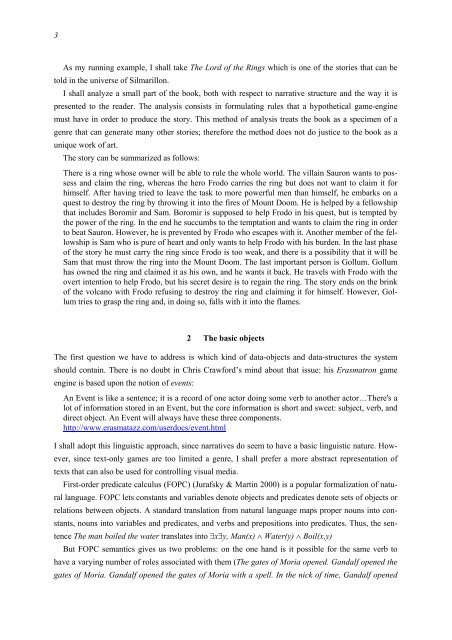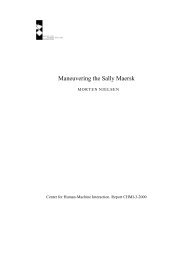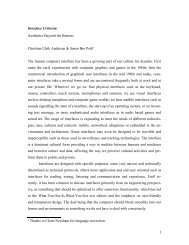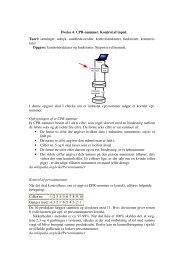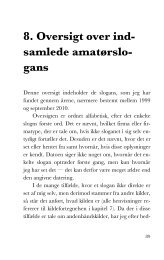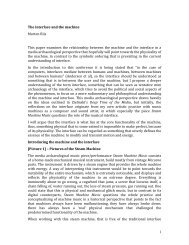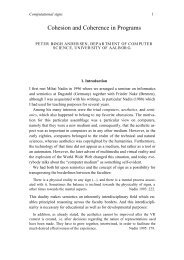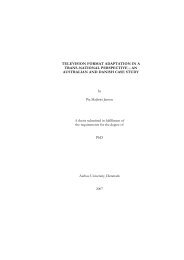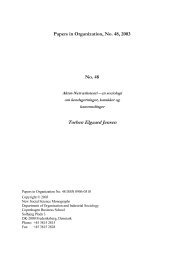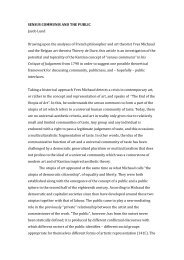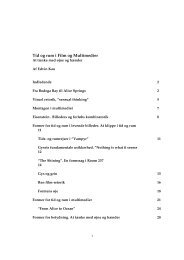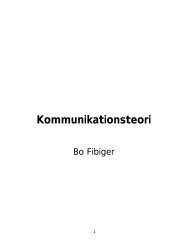Interaction and narration. Tearing Tolkien apart - CiteSeerX
Interaction and narration. Tearing Tolkien apart - CiteSeerX
Interaction and narration. Tearing Tolkien apart - CiteSeerX
Create successful ePaper yourself
Turn your PDF publications into a flip-book with our unique Google optimized e-Paper software.
3<br />
As my running example, I shall take The Lord of the Rings which is one of the stories that can be<br />
told in the universe of Silmarillon.<br />
I shall analyze a small part of the book, both with respect to narrative structure <strong>and</strong> the way it is<br />
presented to the reader. The analysis consists in formulating rules that a hypothetical game-engine<br />
must have in order to produce the story. This method of analysis treats the book as a specimen of a<br />
genre that can generate many other stories; therefore the method does not do justice to the book as a<br />
unique work of art.<br />
The story can be summarized as follows:<br />
There is a ring whose owner will be able to rule the whole world. The villain Sauron wants to possess<br />
<strong>and</strong> claim the ring, whereas the hero Frodo carries the ring but does not want to claim it for<br />
himself. After having tried to leave the task to more powerful men than himself, he embarks on a<br />
quest to destroy the ring by throwing it into the fires of Mount Doom. He is helped by a fellowship<br />
that includes Boromir <strong>and</strong> Sam. Boromir is supposed to help Frodo in his quest, but is tempted by<br />
the power of the ring. In the end he succumbs to the temptation <strong>and</strong> wants to claim the ring in order<br />
to beat Sauron. However, he is prevented by Frodo who escapes with it. Another member of the fellowship<br />
is Sam who is pure of heart <strong>and</strong> only wants to help Frodo with his burden. In the last phase<br />
of the story he must carry the ring since Frodo is too weak, <strong>and</strong> there is a possibility that it will be<br />
Sam that must throw the ring into the Mount Doom. The last important person is Gollum. Gollum<br />
has owned the ring <strong>and</strong> claimed it as his own, <strong>and</strong> he wants it back. He travels with Frodo with the<br />
overt intention to help Frodo, but his secret desire is to regain the ring. The story ends on the brink<br />
of the volcano with Frodo refusing to destroy the ring <strong>and</strong> claiming it for himself. However, Gollum<br />
tries to grasp the ring <strong>and</strong>, in doing so, falls with it into the flames.<br />
2 The basic objects<br />
The first question we have to address is which kind of data-objects <strong>and</strong> data-structures the system<br />
should contain. There is no doubt in Chris Crawford’s mind about that issue: his Erasmatron game<br />
engine is based upon the notion of events:<br />
An Event is like a sentence; it is a record of one actor doing some verb to another actor…There's a<br />
lot of information stored in an Event, but the core information is short <strong>and</strong> sweet: subject, verb, <strong>and</strong><br />
direct object. An Event will always have these three components.<br />
http://www.erasmatazz.com/userdocs/event.html<br />
I shall adopt this linguistic approach, since narratives do seem to have a basic linguistic nature. However,<br />
since text-only games are too limited a genre, I shall prefer a more abstract representation of<br />
texts that can also be used for controlling visual media.<br />
First-order predicate calculus (FOPC) (Jurafsky & Martin 2000) is a popular formalization of natural<br />
language. FOPC lets constants <strong>and</strong> variables denote objects <strong>and</strong> predicates denote sets of objects or<br />
relations between objects. A st<strong>and</strong>ard translation from natural language maps proper nouns into constants,<br />
nouns into variables <strong>and</strong> predicates, <strong>and</strong> verbs <strong>and</strong> prepositions into predicates. Thus, the sentence<br />
The man boiled the water translates into ∃x∃y, Man(x) ∧ Water(y) ∧ Boil(x,y)<br />
But FOPC semantics gives us two problems: on the one h<strong>and</strong> is it possible for the same verb to<br />
have a varying number of roles associated with them (The gates of Moria opened. G<strong>and</strong>alf opened the<br />
gates of Moria. G<strong>and</strong>alf opened the gates of Moria with a spell. In the nick of time, G<strong>and</strong>alf opened


